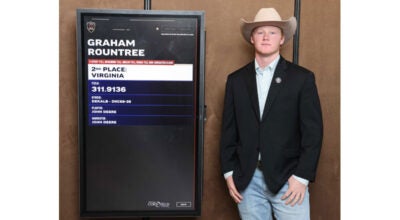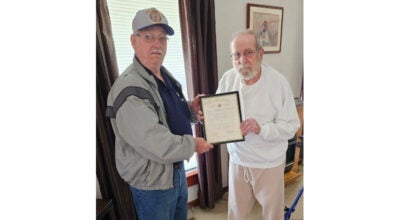Board amends ordinance to change road signs
Published 6:39 pm Wednesday, September 30, 2020
|
Getting your Trinity Audio player ready...
|
COURTLAND
Following several speakers at a public hearing and discussion among the Southampton County supervisors, the board unanimously agreed at its recent meeting to amend the Section 14-125 of the county code. That part guides how the names of existing roads and streets can be changed.
What has prompted the action has been the public movement to replace two road names that many residents — both Black and White — find deeply offensive. Specifically, Blackhead Signpost Road and Hanging Tree Road. The former is associated with the grim fate of Nat Turner and his followers after their insurrection of 1831 in the county. The latter refers to a tree that leans, not one specifically used for lynching. Nonetheless, the connotation has apparently been troubling to many people.
The hearing followed the Planning Commission’s recommendation during its meeting in August to approve the proposed amendment, which reads in part: “Requests to change the name(s) of existing streets may be initiated:
1. By resolution of the Board of Supervisors; or
2. By petition containing signatures of a majority of landowners of said street along with a review fee of $500 to the [subdivision] agent.
“In either care, the agent shall forward the request to the planning commission for 17 public hearing and review. The board of supervisors shall hold a public hearing after receiving a 18 recommendation from the planning commission on the request.”
Before this adoption, only a majority of landowners on a street could initiate the request for a name change.
The first to speak was Ash Cutchin, who said he’s lived in in the area for 20-plus years. He acknowledged that even he’s now certain how some roads got their names. His concern is that changing the road names is not going to change the county’s history where slavery is concerned.
“I say leave the ordinance where it is,” said Cutchin. “Leave road and statues in place. Those offended can create a monument to Nat Turner.”
Dr. Deborah Goodwyn, chairwoman of the Southampton County School Board, simply stated that she supports effort to change road names.
Travis Parker, a member of the Citizens for Change, said the ordinance now is “an issue that is one of right or wrong.”
He urged the supervisors to vote to amend the code.
Gary Cross countered, “The ordinance has served us well. But there’s room to tweak it.”
He pointed out how much mail people get with their address on it, and that “it’s a huge undertaking to change mail.
“Where does it end when just a few can petition[for the name changes]? Don’t make this more complicated than it is.”
Janis Tripplet called the road names “a disgrace and embarrassing. The inconvenience does not outweigh injustice of what those road signs mean. It’s a simple fix.”
Ricky Blount, who had spoken before on the matter this past summer, is also a member of Citizens for Change, which he said promotes harmony as one of its goals. He’s in full support of the ordinance change “so that landowners don’t get sole power of initiating change.”
Michelle Covington, also a previous speaker, encouraged the supervisors to vote for change.
“To amend it to allows you to vote without the consent of 51 percent of the street’s residents
Supervisor Dallas Jones made an immediate motion to approve, but Chairman Dr. Alan Edwards interrupted to say he wants to hear what others say.”
Christopher D. Cornwell Sr. said, “I’ve prayed over and thought about it. I’m completely favoring changing the road names. Though whole ordinance thing, I’m not comfortable circumventing it.”
Lynda Updike supports name changes, “ but I don’t want to change the ordinance. I’m not in favor of changing the code.”
William Hart Gillette, vice chairman, said, “I would just like to trust my fellow man. I will respect any vote. There are more messages to change than not change it. I’ll support the change. That’s just my own conviction.”
Robert White said that people have called him to leave it be, “But I will vote to change it.”
Carl Faison said, “This [amended] ordinance simply gives board the power to change the roads, and to end a hardship on many people. I think we need to recognize that. We are not destroying this ordinance, it’s simply a new avenue for this to be addressed.
Edwards acknowledged that he’s been vacillating back and forth on the matter, but favored the change after Jones again made the motion.





